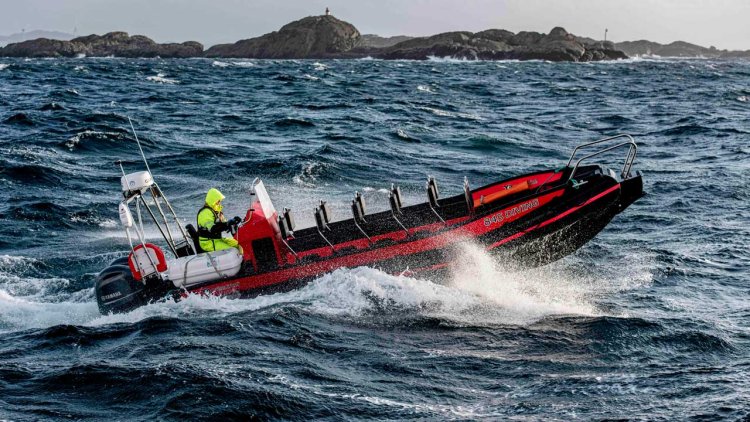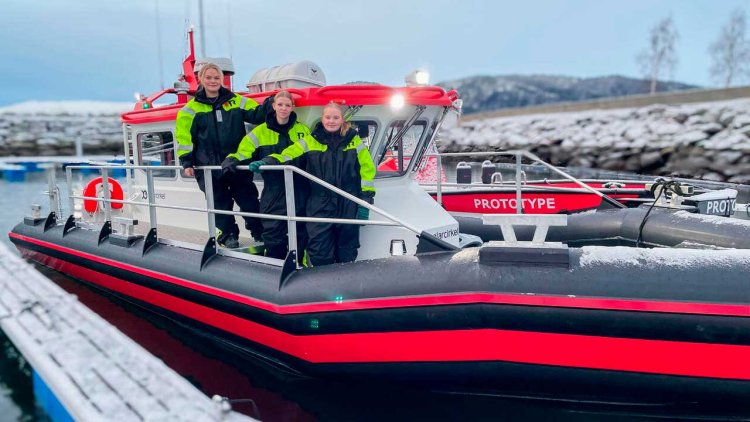The world's first boat hull with climate-neutral raw materials
AKVA group has received certification through ISCC PLUS to use raw materials based on bio-based and recycled raw materials such as forest waste and used cooking oil in the production of both workboats and fish pens

AKVA group has received certification through ISCC PLUS to use raw materials based on bio-based and recycled raw materials such as forest waste and used cooking oil in the production of both workboats and fish pens.
The Polarcirkel boat remains identical, constructed with the same material, with a significant change: the virgin materials no longer come from fossil oil but are sourced from plants. This transition to sustainable sources makes the boat hull climate-neutral. The boat's main task remains to ensure the safety of employees at sea. The raw material will be purchased from the same suppliers as before, to ensure that the quality remains identical.
“Safety at sea is our main goal, and this is achieved just as effectively by using new raw materials. We want to offer aquaculture operators a more sustainable choice. By embracing greener alternatives, we contribute to giving them the opportunity to make environmentally conscious decisions and thus contribute to a more sustainable future - whether you opt for motor-driven or electric motor,” says General Manager of AKVA group Helgeland Plast Freddy Bakken Braseth.
Through the integration of climate-neutral boat hulls in plastic, AKVA group has not only a technological advancement but has also created a product with a significantly reduced carbon footprint.

Polarcirkel is handcrafted in Mo i Rana and has made its mark on the global market. The boats are known for their practical design, high quality, flexibility, and low maintenance requirements. With over 2000 boats in operation worldwide, they have become an icon in aquaculture and are preferred among various professions that require reliable and seaworthy vessels.
“It's not only fish farmers who use Polarcirkel. They are also used in service by sea-based industries, the oil and gas sector, rescue services, defense, Arctic tour operators, and even among recreational boaters. Polarcirkel is designed to withstand the toughest conditions, from icy -40°C to hot +55°C, offering unparalleled safety and reliability, whether operating in the Arctic or the tropics,” says Braseth.
For approximately 50 years, Polarcirkel has been developed and improved in close dialogue with fish farmers. Helgeland Betongvarefabrikk (later renamed Helgeland Plast) was established in 1969 and developed the world's first plastic fish pen, Polarcirkel, in 1973. Later, Helgeland Plast became a part of AKVA group. In addition to boat and fish pen deliveries, they operate a pipe factory that produces pipes for everything from infrastructure to land-based facilities. Over the years, they have increased production capacity and invested significantly to improve their products.
Suppliers of raw materials to AKVA group Helgeland Plast have analyzed the carbon footprint of the material that can now be used in production following the ISCC PLUS certification. 90% of the raw material is bio-circular, which reduces CO2 emissions. The raw material is sourced from waste and residual streams. Rail logistics play a role in achieving nearly zero CO2 emissions for delivery to Mo i Rana.
LCA analyses indicate significant environmental benefits of using climate-neutral material, with a minimal carbon footprint of 0.004 kgCO2E/kg. This stands in contrast to the 1.9kg CO2E/kg generated by fossil materials. The reduction represents a saving in terms of carbon footprint.
“By including climate-neutral material into our Polarcirkel boats and pipe productions, we are creating an environmentally friendly practice, and giving new life to overlooked raw materials. This supports our commitment to sustainable technology development,” says Braseth.
AKVA Polarcirkel, in collaboration with suppliers meeting the ISCC PLUS certification requirements, will provide polyolefin products made with renewable raw materials that perform just as well as virgin polyolefins. These sustainable products are versatile, suitable for food contact and health applications, certified by ISCC PLUS, and support sustainability goals without compromising on quality or safety standards. They are based on renewable raw materials from waste and residual streams, contributing to the reduction of the carbon footprint and promoting the transition to a circular economy.


























